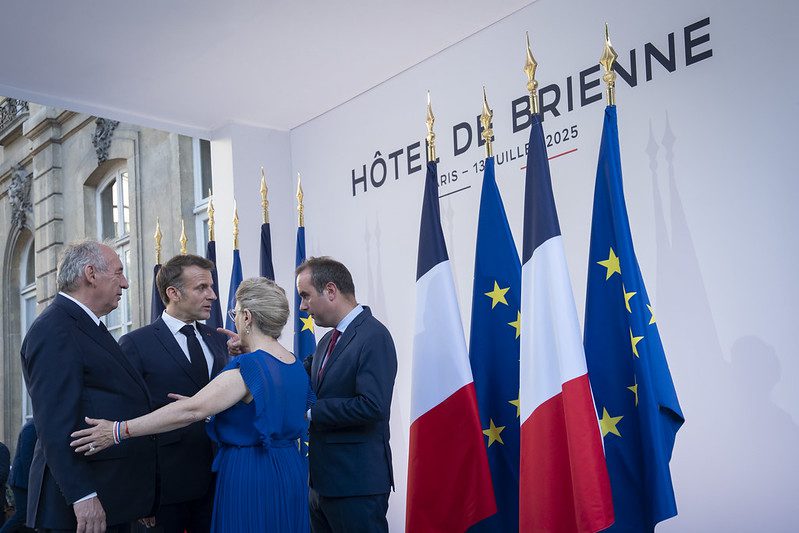French President Emmanuel Macron is under pressure after PM Sébastien Lecornu’s government collapsed within twenty-four hours of its formation. After his resignation, Macron nominated Lecornu yet again, with a 48-hour deadline. There is little time and chances are, his “Mission Impossible” will never see the light of day.
Macron’s governments have frequently been the focus of political debate, as Lecornu (briefly) became Macron’s fifth Prime Minister. Lecornu’s government collapsed as his right-wing partners refused to collaborate with the nominated PM. More than a political crisis, the current events threaten to turn into an economic crisis. France is still operating on last year’s budget, while the political crisis is a direct consequence of an earlier decision by Macron. Back in 2024, the President decided to dissolve the National Assembly, which led to the current uncertainty.
Lecornu had a difficult mission: finding a compromise between the Republicans (LR) and the left-wing Socialists (PS), in addition to Macron’s Party. This is a deadlock that has persisted since last year, contributing to ongoing governmental instability. According to the Republicans, the trust has been broken in Lecornu’s proposal, where the PM did not communicate well with LR about the inclusion of key positions, such as Bruno Le Maire as the Minister of Defence. He is accused of being guilty of irresponsibly spending millions from the state budget, which is why he is deemed problematic. Le Maire reacted angrily, and is reported to have said “I’m outta here, no problem”.
The Socialists hold a similar opposition on the other end, claiming that Lecornu tried to disguise his government proposal as a centre-right faction which does not uphold the party’s expectations. PS claim they want serious changes, both on the ecological and social fronts. In the belief that these are impossible with a center-right majority, they have also refused to cooperate with PM Lecornu. This sentiment was even stronger among LFI, the far-left party led by Jean-Luc Mélenchon, who accused the Lecornu government of being “illegitimate”.
Rassemblement National (RN) has been somewhat silent, instead focusing on picking up frustrating voters from the Republicans. Following the crisis, Marine Le Pen called for elections, in the belief that it would benefit her party. Indeed, her party benefitted from the dissolution of the Assembly a year ago, as support for RN grows year after year.

Image: President Macron at the Hotel De Brienne – Laurent Blevennec / Présidence de la République
Macron does not have many options left: since 2024, he has relied on minority cabinets to keep power. When he nominated Lecornu for the PM position in late summer, he initially hoped he would gather a compromise between the different political factions. Should he be incapable of finding an agreement, Macron finds himself with limited options.
The first one would be his own resignation, which is something he has repeatedly protested against. With his term ending in 2027, chances are he will never contemplate his resignation, instead opting to continue his presidency despite mounting pressure. Another option would be the dissolution of the National Assembly, which was the joker move he pulled a year ago. The result was the current political crisis, making another dissolution unlikely.
In his nomination choices, Emmanuel Macron has often looked to choose centre-right PMs, in the hope that they would gather support from the Republicans and his party, and potentially some of the Socialist votes. However, one after the other, they have been unable to do so. Macron’s remaining option would be to nominate a Socialist or more left-leaning PM, but this is considered unlikely. The Socialists are known to focus on taxing the wealthy, and other left-wing positions which would make reaching a governing agreement difficult.
Prior to the events of the last three days, Macron promised he would “take responsibility” if Lecornu would not find a compromise between the different factions. All eyes currently point at him, while parliamentary elections may be around the corner. At the same time, France’s budget deficit is expected to reach just over 5% of GDP, which has increased pressure on the new government. The current situation requires urgent actions, while a caretaker PM is unlikely to find a majority to cut public spending. The French market has already experienced a serious downfall in recent days following Lecornu’s resignation.

Image: Prime Minister (Former Defence Secretary) Sebastien Lecornu at the 2025 NATO Summit – NATO
Lecornu, long known for being a Macron loyalist, is not the only faithful soldier who may switch camps. Ex-PM Gabriel Attal, otherwise loyal, slashed Macron’s decision on French TV Channel TF1: “Like many French people, I no longer understand his [the President’s] decisions”.
Édouard Philippe, a former Macron ally, also said that “he did not agree” with Macron’s vision and “advised him to resign”.
In a rare move, far-left Jean-Luc Mélenchon joined far-right Marine Le Pen and called for elections, which is why Macron has refused to comply with the request thus far. A meeting is expected between these parties tonight, which the Republicans have already refused to attend, citing a lack of “trust”. RN has also refused to attend, while the Socialists have confirmed their attendance.
President Macron has been under pressure since last year, but never has all eyes pointed at him. This is why the current political crisis differs from the others, leaving Macron with no good options. For now, French citizens will have to wait until tonight, and see the outcome of Lecornu’s final reshuffle attempt. Should he fail, this could be the beginning of the end for Emmanuel Macron and his party.
Featured Image via Présidence de la République France – Laurent Blevennec




